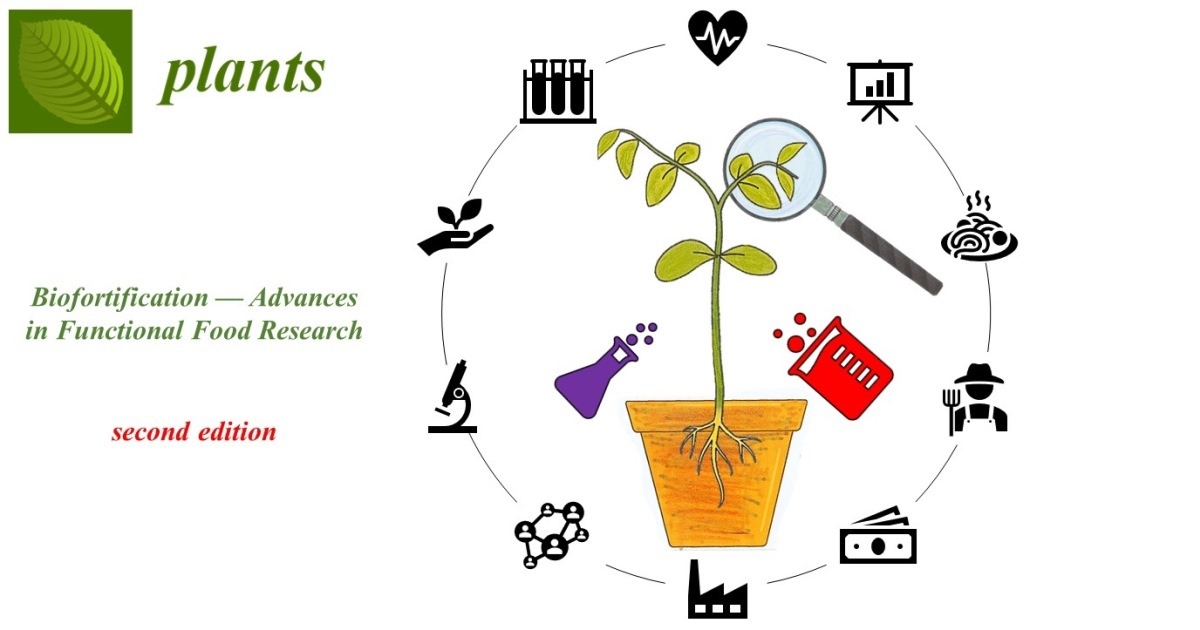Biofortification—Advances in Functional Food Research II
A special issue of Plants (ISSN 2223-7747). This special issue belongs to the section "Plant Physiology and Metabolism".
Deadline for manuscript submissions: closed (10 December 2022) | Viewed by 4336

Special Issue Editor
Interests: trees; dendroremediation; phytoremediation; phytoextraction; arsenic; environmental pollution; speciation; analytical chemistry
Special Issues, Collections and Topics in MDPI journals
Special Issue Information
Dear Colleagues,
There is no doubt that our health depends mainly on the quality of our food. When the food a person consumes lacks certain critical macro- or micronutrients, they are more likely to get sick. This is a topic of increasing concern today, especially as more and more people are switching to plant-based diets, and it has been determined that plant-based foods may not contain enough minerals. One reason for the low content of nutrients in plants is the deficiency of these nutrients in the soils where crops are grown. This deficiency results from removing elements with plant yield, insufficient fertilization, and limitation of the introduction of ingredients into the environment from industrial sources. Elements present in soils can also occur in forms that are difficult to absorb and inaccessible to plants. Growing crops with high yields is also not conducive to accumulating large amounts of elements.
Biofortification is a promising approach to enriching our diet with specific nutrients. It is a method of plant breeding and production, whose goal is to enhance the nutritional value of a product by supplementing it with bioavailable nutrients such as calcium (Ca), copper (Cu), iron (Fe), iodine (I), magnesium (Mg), selenium (Se) or zinc (Zn), which are present in the natural human diet in a small amount. In other words, food produced through biofortification has an additional positive effect on health over and above the biological nutritional value. The aim is for consumption of these improved foods to reduce the occurrence of diseases caused by elemental deficiencies.
Therefore, in this Special Issue, articles (original research papers, perspectives, hypotheses, opinions, reviews, modelling approaches, and methods) that focus on biofortification and production of functional food such as whole plant studies, field trials, and agronomics in model plants, crop plants, trees, aquatic plants, native species, and mushrooms are most welcome.
I encourage you to submit your valuable results.
Dr. Sylwia Budzynska
Guest Editor
Manuscript Submission Information
Manuscripts should be submitted online at www.mdpi.com by registering and logging in to this website. Once you are registered, click here to go to the submission form. Manuscripts can be submitted until the deadline. All submissions that pass pre-check are peer-reviewed. Accepted papers will be published continuously in the journal (as soon as accepted) and will be listed together on the special issue website. Research articles, review articles as well as short communications are invited. For planned papers, a title and short abstract (about 250 words) can be sent to the Editorial Office for assessment.
Submitted manuscripts should not have been published previously, nor be under consideration for publication elsewhere (except conference proceedings papers). All manuscripts are thoroughly refereed through a single-blind peer-review process. A guide for authors and other relevant information for submission of manuscripts is available on the Instructions for Authors page. Plants is an international peer-reviewed open access semimonthly journal published by MDPI.
Please visit the Instructions for Authors page before submitting a manuscript. The Article Processing Charge (APC) for publication in this open access journal is 2700 CHF (Swiss Francs). Submitted papers should be well formatted and use good English. Authors may use MDPI's English editing service prior to publication or during author revisions.
Keywords
- biofortification
- functional food
- diet enrichment
- nutritional value
- supplementation
- elemental deficiencies
Benefits of Publishing in a Special Issue
- Ease of navigation: Grouping papers by topic helps scholars navigate broad scope journals more efficiently.
- Greater discoverability: Special Issues support the reach and impact of scientific research. Articles in Special Issues are more discoverable and cited more frequently.
- Expansion of research network: Special Issues facilitate connections among authors, fostering scientific collaborations.
- External promotion: Articles in Special Issues are often promoted through the journal's social media, increasing their visibility.
- Reprint: MDPI Books provides the opportunity to republish successful Special Issues in book format, both online and in print.
Further information on MDPI's Special Issue policies can be found here.






